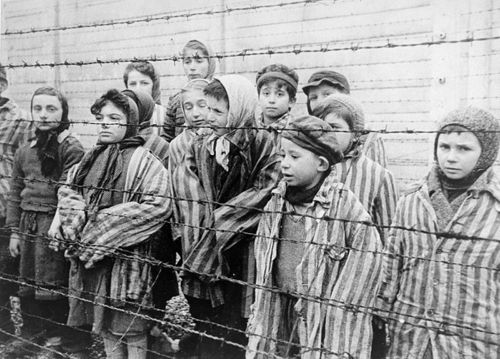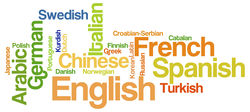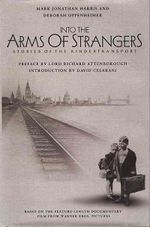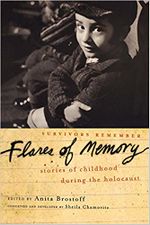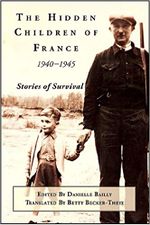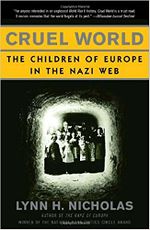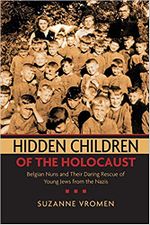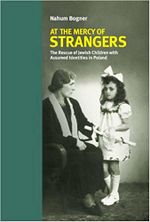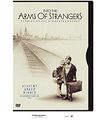Category:Holocaust Children Studies--2000s
|
|
Holocaust Children Studies : 2020s -- 2010s -- 2000s -- 1990s -- 1980s -- 1970s -- 1960s -- 1950s -- 1940s -- 1930s -- Home General : 2020s -- 2010s -- 2000s -- 1990s -- 1980s -- 1970s -- 1960s -- 1950s -- 1940s -- 1930s -- 1920s -- 1910s -- 1900s -- 1850s -- 1800s -- 1700s -- 1600s -- 1500s -- 1450s -- Medieval -- Home
|
2000
Mark Jonathan Harris, and Deborah Oppenheimer. Into the Arms of Strangers: Stories of the Kindertransport (New York, NY, and London: Bloomsbury, 2000).
"Chronicles the events and people involved in the rescue of 10,000 children from Nazi territories, and what happened after the war. Official tie-in to the Warner Brothers documentary. First hand account of the extraordinary rescue mission of 10,000 children before the outbreak of World War II. For nine months before the outbreak of World War II, Britain conducted an extraordinary rescue mission. It opened its doors to over 10,000 endangered children, 90 percent of them Jewish, from Germany, Austria, and Czechoslovakia. These children were taken into foster homes and hostels in Britain, expecting eventually to be reunited with their parents. Most of the children never saw their families again. Into the Arms of Strangers recounts the remarkable story of this rescue operation, known as the Kindertransport, and its dramatic impact on the lives of the children who were saved. The book is the companion to the feature-length documentary which was released in the theatres by Warner Bros. in Fall 2000. It contains stories in their own words from the child survivors, rescuers, parents, and foster parents. They recount, in harrowing detail, the effects of the Nazi's reign of terror, the horror of Kristallnacht, the agonizing decision by the parents to send their children away, the journey, the difficulties of adjustment in Britain, the outbreak of war, and the children's tragic discovery afterward that most of their parents had perished in concentration camps. The stories are heartbreaking, but also inspiring. These are the stories of those who survived with the help of others; they are stories about the strength and resolve of children; and most astonishing, these are stories not yet heard about the Holocaust."--Publisher description.
2001
Anita Brostoff, ed. Flares of Memory: Stories of Childhood during the Holocaust (New York : Oxford University Press, 2001).
"A collection of "over one hundred brief stories written by survivors from Germany, Poland, Lithuania, the Netherlands, Czechoslovakia, Austria, and the Balkan countries ... along with "poignant recollections of American liberators who were devastated by the horrors they discovered after the fall of the Nazis ... In a series of writing workshops at the Holocaust Center of Pittsburgh, survivors who were children or teens during World War II assembled to remember the pivotal moments in which their lives were irreparably changed by the Nazis. These "flares of memory" preserve the voices of over forty Jews from throughout Europe who experienced a history that cannot be forgotten ... Ninety-two brief vignettes arranged both chronologically and thematically recreate the disbelief and chaos that ensued as families were separated, political rights were abolished, and synagogues and Jewish businesses were destroyed. Survivors remember the daily humiliation, the quiet heroes among their friends, and the painful abandonment by neighbors as Jews were restricted to ghettos, forced to don yellow stars, and loaded like cattle into trains. Vivid memories of hunger, disease, and a daily existence dependent on cruel luck provide penetrating testimonies to the ruthlessness of the Nazi killing machine, yet they also bear witness to the resilience and fortitude of individual souls bombarded by evil."--Publisher description.
2004
Danielle Bailly, ed. Traqués, cachés, vivants: des enfants juifs en France (Paris: L'Harmattan, 2004).
English tr. by Betty Becker-Theye. The Hidden Children of France: Stories of Survival (Albany, NY: Excelsior Editions/State University of New York Press, 2010).
"The history of France's 'hidden children' and of the French citizens who saved six out of seven Jewish children and three-fourths of the Jewish adult population from deportation during the Nazi occupation is little known to American readers. In The Hidden Children of France, 1940-1945, Danielle Bailly (a hidden child herself whose family travelled all over rural France before sending her to live with strangers who could protect her) reveals the stories behind the statistics of those who were saved by the extraordinary acts of ordinary people. Eighteen former 'hidden children' describe their lives before, during, and after the war, recounting their incredible journeys and expressing their deepest gratitude to those who put themselves at risk to save others."--Publisher description.
"C'était entre 1939 et 1945. Ils étaient des enfants, âgés de un à dix ans lorsqu'ils furent marqués comme juifs et traqués du seul fait de leur naissance. Cachés, souvent séparés de leurs parents dont certains disparurent à jamais, ils survécurent. Soixante ans après, ils sont ici dix-huit à témoigner et à tenter de tirer de leur expérience des enseignements pour l'avenir. Ils ont, en effet, connu chacun le meilleur et le pire de l'humain autour d'eux. Ils nous disent et ce qu'on leur a fait, et ce qu'ils en ont fait."--Publisher description <French>.
2004
Die Mädchen von Zimmer 28: Freundschaft, Hoffnung und Uberleben in Theresienstadt (München: Droemer Knaur 2004) is a collection of memoirs of Holocaust survivors from Theresienstadt, edited by Hannelore Brenner-Wonschick.
The girls of Room 28: Friendship, Hope, and Survival in Theresienstadt, English ed. by John E. Woods and Shelley Frisch (New York : Schocken Books, 2009).
Also translated into Polish, Czech, and Portuguese.
KEYWORDS: <Theresienstadt>
"From 1942 to 1944, 15,000 children passed through the internment camp on their way to Auschwitz. Only 100 of them survived the war. In this book, 12 of these children--mothers and grandmothers today in their 70s--tell how they did it ... German journalist Hannelore Brenner met these child survivors."--Publisher description.
2005
Lynn H. Nicholas. Cruel World: The Children of Europe in the Nazi Web (New York: Knopf, 2005).
A general introduction to the lives of children in Europe under Nazi rule (Jews and non-Jews).
"In this riveting, powerful narrative, Lynn Nicholas shows how children under the Nazis became mere objects available for use in the service of the totalitarian state. Nicholas recounts the euthanasia and eugenic selection, racist indoctrination, kidnapping and “Germanization,” mass executions, and slave labor to which the Nazis subjected Europe’s children. She also captures the uprooted children’s search for their families in the aftermath of the war. A disturbing and absolutely necessary work, Cruel World opens a new chapter in World War II studies."--Publisher description.
2008
Suzanne Vromen. Hidden Children of the Holocaust: Belgian Nuns and their Daring Rescue of Young Jews from the Nazis (Oxford, and New York: Oxford University Press,2008).
"In the terrifying summer of 1942 in Belgium, when the Nazis began the brutal roundup of Jewish families, parents searched desperately for safe haven for their children. As Suzanne Vromen reveals in Hidden Children of the Holocaust, these children found sanctuary with other families and schools--but especially in Roman Catholic convents and orphanages ... Vromen has interviewed not only those who were hidden as children, but also the Christian women who rescued them, and the nuns who gave the children shelter, all of whose voices are heard in this powerfully moving book. Indeed, here are numerous first-hand memoirs of life in a wartime convent--the secrecy, the humor, the admiration, the anger, the deprivation, the cruelty, and the kindness--all with the backdrop of the terror of the Nazi occupation. We read the stories of the women of the Resistance who risked their lives in placing Jewish children in the care of the Church, and of the Mothers Superior and nuns who sheltered these children and hid their identity from the authorities. Perhaps most riveting are the stories told by the children themselves--abruptly separated from distraught parents and given new names, the children were brought to the convents with a sense of urgency, sometimes under the cover of darkness. They were plunged into a new life, different from anything they had ever known, and expected to adapt seamlessly. Vromen shows that some adapted so well that they converted to Catholicism, at times to fit in amid the daily prayers and rituals, but often because the Church appealed to them. Vromen also examines their lives after the war, how they faced the devastating loss of parents to the Holocaust, struggled to regain their identities and sought to memorialize those who saved them ... This remarkable book offers an inspiring chronicle of the brave individuals who risked everything to protect innocent young strangers, as well as a riveting account of the "hidden children" who lived to tell their stories."--Publisher description.
2009
Nahum Bogner. At the Mercy of Strangers: The Rescue of Jewish Children with Assumed Identities in Poland (Jerusalem: Yad Vashem, 2009).
"Hidden under false identities in cities, on farms and in convents and monasteries, young Jewish children survived the war by the grace of kindhearted strangers. Their story is told by an historian who survived the war as a child. He describes how the emotional closeness so essential for survival made it so hard for the children to leave their host families after the war ... The book was awarded the Buchman Prize of Yad Vashem for Holocaust Literature."--Publisher description.
Media in category "Holocaust Children Studies--2000s"
The following 66 files are in this category, out of 66 total.
- 2000 Enzer (ed).jpg 400 × 597; 43 KB
- 2000 Harris doc.jpg 342 × 400; 17 KB
- 2000 Harris.jpg 400 × 605; 39 KB
- 2000 Hemmendinger Krell en.jpg 348 × 499; 33 KB
- 2000 Hemmendinger.jpg 399 × 576; 42 KB
- 2000 Spier.jpg 322 × 499; 12 KB
- 2001 Bennett - Gottesfeld (novel).jpg 253 × 386; 54 KB
- 2001 Brostoff.jpg 333 × 499; 30 KB
- 2001 Bruck en.jpg 315 × 499; 29 KB
- 2001 Dornhelm film.jpg 312 × 445; 28 KB
- 2001 Müller es (book).jpg 1,003 × 1,644; 276 KB
- 2001 Netten (doc).jpg 230 × 345; 22 KB
- 2001 Velmans.jpg 290 × 474; 29 KB
- 2001 Warren.jpg 405 × 500; 36 KB
- 2002 David en.jpg 316 × 499; 31 KB
- 2002 Debbia.jpg 354 × 499; 36 KB
- 2002 Jugnot (film).jpg 768 × 1,024; 125 KB
- 2002 Ligocka.jpg 399 × 582; 63 KB
- 2002 Mehler (doc).jpg 1,920 × 2,560; 296 KB
- 2002 Richman.jpg 358 × 499; 28 KB
- 2002 Slesin (doc).jpg 1,000 × 1,422; 119 KB
- 2002 Voigt it.jpg 315 × 499; 21 KB
- 2002 Voigt.jpg 325 × 500; 18 KB
- 2002 Zapruder.jpg 325 × 499; 20 KB
- 2002 Zargani en.jpg 323 × 499; 25 KB
- 2003 Behar.jpg 375 × 499; 16 KB
- 2003 Marrone.jpg 201 × 304; 10 KB
- 2003 Schiffer.jpg 201 × 300; 11 KB
- 2004 Appelfeld en.jpg 331 × 499; 49 KB
- 2004 Bacon.jpg 317 × 474; 29 KB
- 2004 Bailly.jpg 326 × 499; 28 KB
- 2004 Brenner de.jpg 325 × 499; 26 KB
- 2004 Indig.jpg 300 × 499; 27 KB
- 2004 Pompucci film.jpg 1,000 × 1,438; 191 KB
- 2005 Bigielman.jpg 305 × 499; 9 KB
- 2005 Koltai (film).jpg 260 × 383; 19 KB
- 2005 Millman.jpg 341 × 499; 30 KB
- 2005 Milton.jpg 333 × 499; 38 KB
- 2005 Modiano.jpg 201 × 308; 10 KB
- 2005 Nicholas.jpg 325 × 499; 33 KB
- 2005 Vasvári (ed).jpg 400 × 599; 216 KB
- 2006 Finzi.jpg 210 × 291; 10 KB
- 2006 Kugler.jpg 201 × 296; 6 KB
- 2006 Lee.jpg 400 × 604; 41 KB
- 2006 Saurel.jpg 190 × 300; 9 KB
- 2006 Schloss.jpg 327 × 499; 21 KB
- 2006 Zinn-Collis.jpg 325 × 499; 22 KB
- 2007 Berg (repr).jpg 318 × 499; 29 KB
- 2007 Buergenthal.jpg 333 × 499; 30 KB
- 2007 Lizzani (film).jpg 1,000 × 1,441; 132 KB
- 2007 Zargani fr.jpg 297 × 474; 17 KB
- 2008 Block.jpg 317 × 499; 22 KB
- 2008 Eilati en.jpg 333 × 499; 14 KB
- 2008 Goldman.jpg 333 × 499; 28 KB
- 2008 Herman film.jpg 354 × 500; 48 KB
- 2008 Rekhtman.jpg 343 × 500; 41 KB
- 2008 Vromen.jpg 333 × 499; 49 KB
- 2009 Abrams - Blaikie.jpg 375 × 499; 43 KB
- 2009 Bauman.jpg 318 × 499; 40 KB
- 2009 Bogner.jpg 337 × 499; 21 KB
- 2009 Brenner en.jpg 330 × 499; 29 KB
- 2009 Jones (film).jpg 450 × 637; 22 KB
- 2009 Prose (book).jpg 394 × 600; 79 KB
- 2009 Sed.jpg 201 × 315; 8 KB
- 2009 Tobias.jpg 200 × 300; 27 KB
- 2011 Kor.jpg 322 × 499; 23 KB
